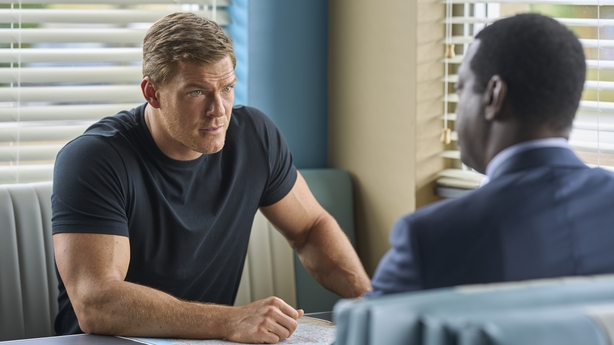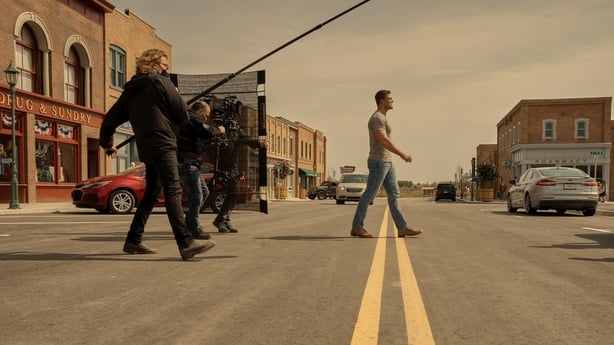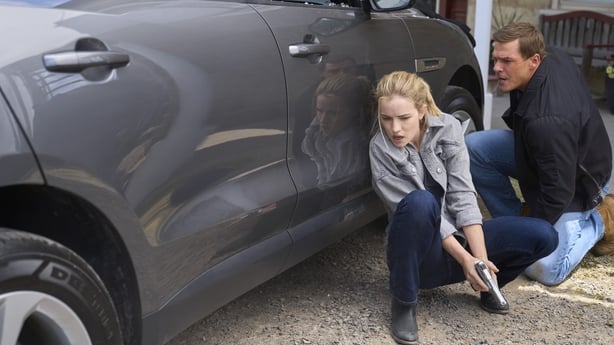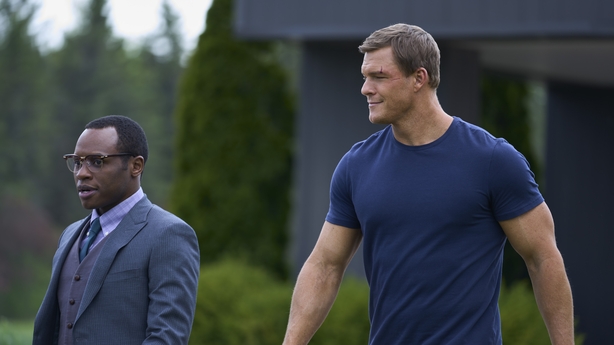Author Lee Child is a very happy man, fans of his iconic hero Jack Reacher should be too.
After Tom Cruise's film forays as the justice-dispensing nomad, Child and his fellow producers have found the right man for Reacher, the new Prime Video series based on Child's 1997 debut, Killing Floor.
That man is Alan Ritchson, who makes the character his own - and then some.
Here's the story: having just left the army, former military police investigator Jack Reacher makes good on his promise to himself to become a drifter, "carrying no phone and the barest of essentials as he travels the country and explores the nation he once served".
However, when Reacher arrives in the small town of Margrave, Georgia, the towering tough guy immediately becomes the prime suspect in the first murder in 20 years.
Then all hell breaks loose.
Reacher's eight episodes make for a brilliant opening season, with just as much for Lee Child devotees and curious newcomers alike. Within a couple of minutes, it's hard to see anyone else playing Reacher - Ritchson (Titans, Blue Mountain State, The Hunger Games: Catching Fire) is that good.
Below, Lee Child talks about that fateful screen test, the things that have surprised him about the series, and why Jack Reacher no longer belongs to him.
There are a lot of talented actors that tried out for the part and I would not disrespect any of them.
I mean, it was astonishing how much talent there is. I was determined to judge it on the first two seconds of the screen test. I thought that's what was important; that he steps on the screen and that implacable appearance - where you know who he is immediately - that was what was crucial to me. Alan was the one that totally nailed it - saying nothing, doing nothing, just standing there in the first two seconds. He was the one. I thought, 'This is ridiculous! I'm going to be arguing with my fellow producers based on two seconds of a screen test!'. Fortunately, they all agreed. They were all looking for the same thing. That is what we want, just that certainty. 'This is the guy'. Alan had that and I feel very lucky that he committed to the part.
When producers get interested in the Reacher series of books, they run into this problem of 'be careful what you wish for' because an awful lot of Reacher is inside his own head.
For a leading character, he doesn't talk all that much - a lot of the time he's just silent. And so what I was really wanting was an actor who could do both those things: say nothing and look interesting while he's doing it, and also make it obvious that he's thinking really, really fast without doing clichés like furrowing his brow or scratching his head. That is what Alan immediately had. Immediately in the screen test, he was impassive, he was solid, he was fascinating when he was doing nothing. That is exactly what I picture Reacher as and therefore Alan nailed it really from the first couple of seconds.

I think the light and shade in Reacher, especially the way Alan plays him, is what's going to be distinctive.
This is absolutely an action-packed, suspense-filled season, but it's also full of tender moments, it's full of little quips and humour. I think the roundedness of it, the contrast between quiet and loud, I think he nails that so well. That's really what stands out - the dynamic range of the character. And Alan gets that.
It wasn't a deal-breaker that the show began with the first Jack Reacher book, Killing Floor.
But I think it was the obvious choice and a very sensible choice, in as much as this is the introduction. Hopefully, many people are going to enjoy the series for a very long time. The book Killing Floor is set very soon after Reacher has changed his life and left the army so what we see in the book is Reacher learning how to be Reacher. In a sense, that made it perfect for the first season. Over those first two/three episodes, we can actually see Reacher become who he's going to be. So it was totally logical. Nothing was a deal-breaker for me really, but I was so satisfied that we went with the first book because it just makes total sense.

I had never re-read Killing Floor before the series received the green light.
I finished writing it - I remember doing the final revisions and sent it in - and I was immediately focused on the next book and the next book and the next book. I have never re-read any of them! But I re-read Killing Floor last year because of this season - and first of all it was a lot better than I thought it would be! I thought I would be slightly embarrassed by a bit of first novel clunkiness here and there but, actually, it was really good! I was amazed!
I was really happy about that for a day and then the next day I thought, 'Wait, have I got no better?'
Then I got a bit disappointed! But mostly what I remember about Killing Floor was the incredible intensity and passion of writing it. At the end of it, because I knew Reacher was going to be a wanderer who moves on, I knew I was never going to see those other characters again and I was really sad about that. I got exactly the same feeling when I finished watching this first season - 'I am never going to see that supporting cast again'. I was equally sad about that.

Three things surprised me about the series.
First of all, your dream is that it will turn out as good as you can hope, which is a very rare thing. And actually, it turned out better than I could hope so that was surprise number one. Number two was the very first fight, which I felt instinctively was going to be very crucial. It's a fight early [on]; he's in a jail cell, and in the book that's a brutal put-down. I needed it to be 100% brutal and effective. I was judging their approach on that. And it was - it was absolutely great. The third thing was Nick Santora, who's the showrunner and main writer, he went deeply into the characters and one of them - I won't say which it is because it would be a spoiler - but there's something revealed about one of the characters that feels absolutely true and authentic. But I never thought of it myself. I guess I laid the groundwork and he realised what I was doing when I didn't even realise it. So those were the three things that absolutely knocked me out.
In a way, I try to never change Jack Reacher.
What I believe about book readers, especially of series, is that they want comfort and familiarity. They want to know exactly what they're getting. Obviously, the story is going to be different, and the other characters are going to be different, but they need to have the same central character. And so I try really hard never to change him. But, of course, I've grown older. I'm a different person now so he has changed a little bit. I think that, in a way, I used to feel that I was creating him, and then later in the series [of books] I felt he's just there, you know? He does what he wants. I can't control what he does! I would just sit there and see what he would get up to.

At some point after about eight or nine books, Jack Reacher totally migrated out of my ownership into a kind of collective ownership.
For 15 years now, I've been used to the idea that Reacher belongs to everybody, not just to me. I mean literally in terms of book reading, if you read my book, it could be years after I wrote it and it's your mental energy, it's your calories are being burned, and the story is appearing in your head. You're creating Reacher at that point, not me. That's repeated millions of times and so really over 15 years I've become very comfortable with the idea that Reacher does not belong to me anymore; Reacher belongs to the audience. And so to pass him to TV and let my brother [Andrew Child] collaborate [on the books] is not a huge threshold at all. It feels perfectly natural.
The world doesn't change that much in terms of the need for a character like Reacher.
It's not just 25 years. The Reacher-style character - the noble loner, the mysterious stranger, the knight errant - has been around for thousands of years. It's a perpetual part of human storytelling. We want that guy. We either want to be that guy or we want to know that guy or we want him to show up. I mean, everybody's got a problem. I'm sure you've got some kind of problem. It might not be very serious, it could be really serious. But wouldn't it be great if somebody blew into your town, knocked on your door, fixed that problem for you and then very politely said, 'Goodbye' and moved off into the sunset? People have dreamed about that for 3,000 years. Therefore, the character is a perpetual fixture in human narrative. I'm sure even way back before we recorded stories that character has existed - and I'm sure he always will. Reacher just happens to be this period's version of that.
Reacher is streaming now on Prime Video.

